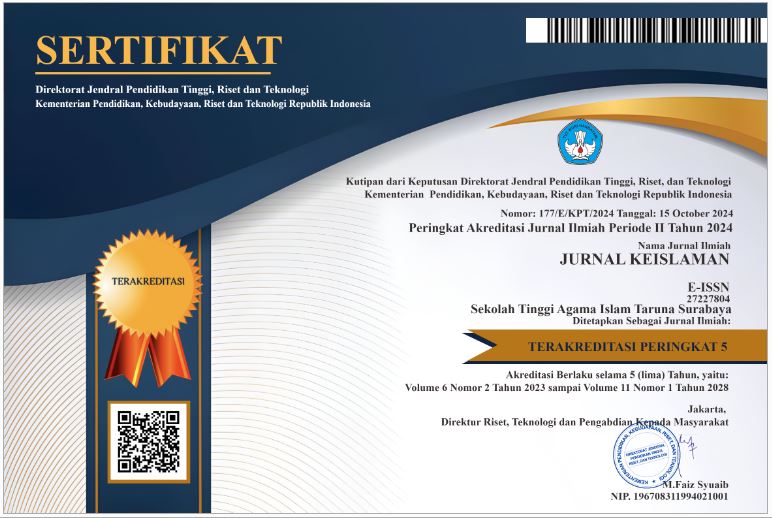Humanisation of Spiritual Education in Fostering Marginalized Communities at Majelis Ta'lim Sabilu Taubah
DOI:
https://doi.org/10.54298/jk.v8i1.330Keywords:
Humanisation, Spiritual Education, Marginalised Communities, Majelis Ta'lim Sabilu TaubahAbstract
Amar ma'ruf nahi munkar is Allah's command to all of us Muslims. As whatever we are wherever we are in whatever position we are. We can fulfil amar ma'ruf nahi munkar according to our abilities, for those who have power through their power, for those who are able to with their mouths then with their tongues, even for those who are unable to do even the smallest amount are still exposed to khat to fulfil with their hearts. Through this research, the author aims to find out how the effectiveness of da'wah that sees from the side of the need and the need for a touch of qolbu through spiritual education as a solution to build basic human awareness (fitroh) individually and socially, which is packaged in accordance with the development of modern times today, which is carried out at Majelis Taklim Sabilu Taubah to marginalised communities. In discussing this research, the author uses a qualitative approach with descriptive characteristics. The da'wah activities at the Sabilu Taubah Ta'lim were founded by Kyai Agus Muhammad Iqdam Kholid or commonly called Gus Iqdam. In this ta'lim assembly, it is very unique unlike other Ta'lim assemblies because the congregation of this ta'lim assembly is mostly from marginalised communities. From this research it can be concluded that the da'wah activities carried out at Majelis Taklim Sabilu Taubah are very effective and appropriate in this modern era by looking at (1) the enthusiasm of the audience following the da'wah study is getting higher and higher (increasing), (2) the dialogical approach taken makes the audience very interested, because there are elements of problem solving and rewards for economic em powerment, (3) the contextuality of the media according to the times so that it makes the audience interested not boring, and (4. the method of delivering spirituality planting material that is relaxed so that it can reach the audience.
Downloads
References
Abdul Ghani Abdullah, Pengantar Kompilasi Hukum Islam dalam Tata Hukum Indonesia, Jakarta, Gema Insani Press: 1994
Abu Bakar Aceh, Pengantar Ilmu Tarekat: Kajian Historis tentang Mistik, Solo: Ramadhani, 1996
Awaludin Pimay, Paradigma Dakwah Humanis, Semarang, RaSAIL: 2005
Amir An Najar, Terjemah Ija Suntana, Psikoterapi Sufistik dalam kehidupan Modern, Bandung: Hikmah, 2004
Alcock, P. Understanding Poverty, London, Mac Millan Press: 1993
Driyarkara dkk, Karya Lengkap Driyarkara; Esai-esai Pemikiran yang Terlibat Penuh dalam Perjuangan Bangsanya, Jakarta: Gramedia
EFA Global Monitoring Report 2010: Reaching the marginalized UK: UNESCO & Oxford University Press, 2010
Emzir, Metodologi Penelitian Kualitatif Analisis Data, Jakarta: PT Raja Grafindo Persada, 2010
Hadari Nawawi, Metode Penelitian Bidang Sosial, Gadjah Mada Universiti Press Jogjakarta,1998
John J. Donohu dan John L. Esposito, Islam dan Pembaharuan, Jakarta, PT. Rajawali: 1989
Kamus Besar Bahasa Indonesia (KBBI), kbbi.web.id. akses 16 Agustus 2023
Kartasapoetra dan hartini, Kamus Sosiologi dan Kependudukan, Jakarta, Bumi Aksara: 1992
M. Ja’far Puteh, Dakwah di Era Globalisasi: Strategi Menghadapi Perubahan Sosial, Yogyakarta, Pustaka Pelajar: 2000
Nanang Martono, Metode Penelitian Kuantitatif, Jakarta: PT Rajagrafindo Persada, 2010
Nurcholis Maadjid, Islam Komodernan dan Keindonesiaan, Bandung, Mizan: 1994
Rafi’udin dan Manan Abdul Jaliel, Prinsip dan Strategi Dakwah, Bandung, Pustaka Setia: 1997
Sanapiah Faisal, Format-Format Penelitian Sosial, Jakarta Raja Grafindo Persada, 1989
Seyyed Hoein Nasr (ed.) Islamic Spirituality Foundation, diterjemahkan Rahman Astuti dengan judul Ensiklopedi Tematis Spiritual Islam, Bandung: Mizan, 2002
Sukardi, Metodologi Penelitian Kompetensi dan Praktiknya, Jakarta: PT. Bumi Aksara, 2009
Sugiyono, Metode Penelitian Pendidikan, Bandung, Alfaabeta: 2012
Victor Conde., A Handbook of International Human Rights Treminology, Lincoln: University of Nebraska, 2004
Y. Argo Trikomo, Pemulung Jalanan Yogyakarta: Kontruksi Marginalitas dan Perjuangan Hidup dalam Budaya-Budaya Dominan, Yogyakarta, Media Pressindo: 1999
Wawancara Jakfar Baehaqi Ajudan Gus Iqdam, 17 Agutus 2023
Rutinan malam selasa 14 Agustus 2023 live youtube Gus Iqdam official https://www.youtube.com/watch?v=QT6a6YulT94&t=1128s
Wawancara bersama Jakfar Baehaqi dan pengamatan media youtube.com pengajian rutinan malam selasa dan malam jumat, aks
Downloads
Published
How to Cite
Issue
Section
License
Copyright (c) 2025 Arif Wibowo

This work is licensed under a Creative Commons Attribution-ShareAlike 4.0 International License.
Authors who publish with this journal agree to the following terms:
- Authors retain copyright and grant the journal right of first publication with the work simultaneously licensed under a Creative Commons Attribution-ShareAlike 4.0 that allows others to share the work with an acknowledgement of the work's authorship and initial publication in this journal.
- Authors are able to enter into separate, additional contractual arrangements for the non-exclusive distribution of the journal's published version of the work (e.g., post it to an institutional repository or publish it in a book), with an acknowledgement of its initial publication in this journal.
- Authors are permitted and encouraged to post their work online (e.g., in institutional repositories or on their website) prior to and during the submission process, as it can lead to productive exchanges, as well as earlier and greater citation of published work (See The Effect of Open Access).


















